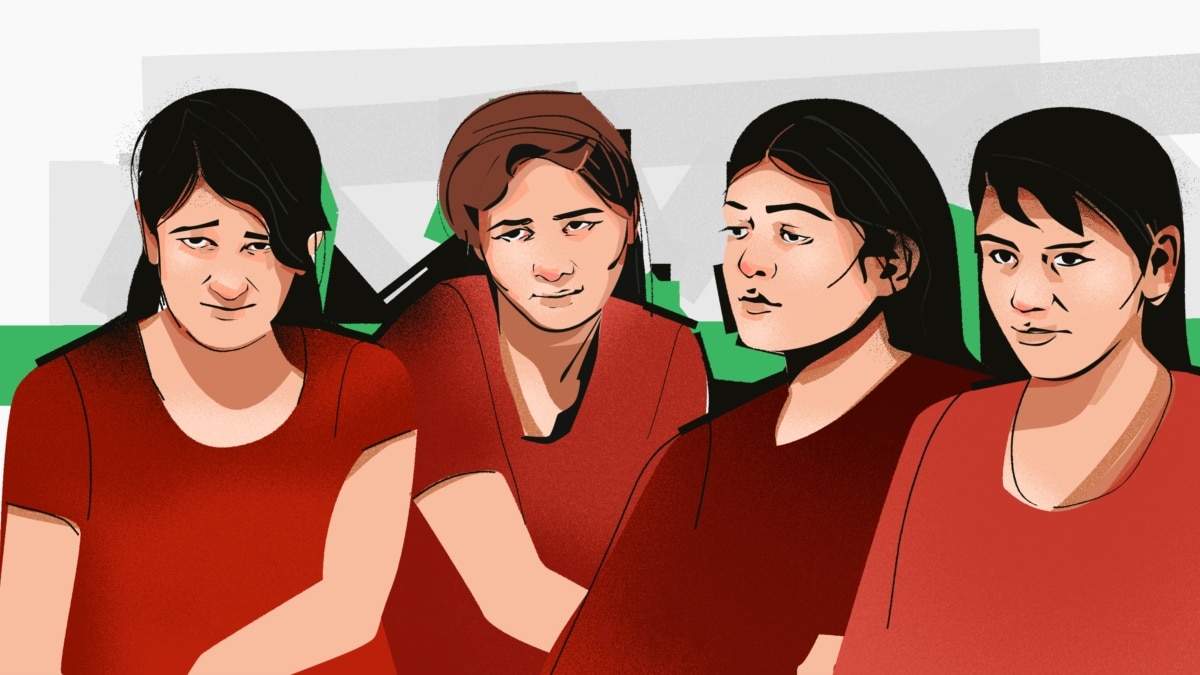For many single women in Azerbaijan, living with restrictions on their movement predated the coronavirus pandemic. As elsewhere in the region, tradition dictates that women who have never been married should only live with their birth families. Though Azerbaijan stresses its support for gender equality, breaking with this practice does not come easy. But for some women in their late teens and 20s, the need can be paramount.
A Run For The Border
Four months ago, 23-year-old Firuza, a designer from Baku, took a bus trip to freedom. But when she reached the Azerbaijani-Georgian border en route to Turkey, Azerbaijan’s border guards had already been warned. She was not allowed to leave the country.
“I argued for a long time, got into a row with them, called the police, but nothing helped,” Firuza* recounted. “The border guards kept me there for six hours until my uncle arrived and took me back” home.
Firuza had committed no crime. She was not wanted by police. But as a disabled , single woman, the child of divorced parents, the only honorable role she can fulfill, her grandparents and uncle believe, is to live at home and follow their rules.
Firuza states she is grateful to her relatives for raising her younger brother and her after her parents divorced when she was six. “But they completely restrict my freedom,” she said. “They control every step, demand that I be home at exactly 6:30 p.m. I am not allowed to go to concerts or to a cafe with friends, to go anywhere.”
The last straw occurred in early January. A friend invited Firuza to a bachelorette party. As often occurs in Azerbaijan, a male relative, her grandfather, escorted her to the site of the party as a protective measure – and to make sure of her destination. After Firuza returned home on her own, her uncle, she said, told her that he would hire a driver to take her to and from work. She would no longer be allowed to ride in a taxi or bus by herself.
“I got agitated, we argued, my uncle hit me, and told me that he was a man, and everything would be the way he said,” she alleged. “I spent a terrible night, and the next morning, saying that I was going to my mother’s house, I left to live with my friend.”
For nine days, thinking what to do next, Firuza lived either with friends or with an employee of a feminist organization. Eventually, she decided to leave for Turkey, Azerbaijan’s cultural cousin, and a frequent destination for Azerbaijanis at odds with their country’s status quo. “My youth is wasted,” she said, explaining her decision. “I'm an adult, after all!”
A friend living in Turkey promised to help her with work and housing. Firuza planned to work there for several months before bringing her mother to live with her. To save money, she decided to make the trip by bus via Georgia, Azerbaijan’s northern neighbor. En route, she SMS’d a close friend about her plans. He passed on word to her mother.
“My relatives started to fuss, and my uncle somehow managed to warn the border guards not to let me out” of the country, Firuza claimed. “He told them that I had mental problems. And they believed him.”
The young woman alleges that her relatives took away her passport once she returned home. They did not beat her, she said, but her situation “even got worse” as her family urged her “not to disgrace” them, she alleged.
Firuza still wants to leave – she has acquired and hidden a new passport – but doubts and a sense of obligation to her grandparents have delayed a second attempt to live on her own.
“They say that I should obey them because they raised me, and this affects me,” she said. “I hesitate. I don’t know what to do.”
Firuza’s family could not be reached for comment.

A Tradition Above The Law
Azerbaijan’s constitution plainly asserts that citizens’ rights cannot be restricted according to sex. International organizations like UN Women report that the government has committed to advancing “the balanced participation of women and men in public and social life.” But the country’s “patriarchal tradition” dictates that “a daughter, no matter how old she is, ‘belongs’ to her parents,” noted Baku sociologist Sanubar Heydarova. “And this means that she is obliged to live with them.” As elsewhere in the South Caucasus, the social expectation that an adult will not leave home until marriage -- and often not even then -- extends to men as well. Police, however, are not known to have searched for single adult men as “runaways” from their families.
For many Azerbaijanis, an unmarried woman living apart from her parents “means that she leads an amoral life” and is “taboo.” Though exceptions can be made if a grown daughter is divorced or studies or works in another city, marriage is generally seen as “the only option” for an unwed adult woman to live long-term outside of her parents’ home without disgracing the family, said Heydarova.“Therefore,” she continued, “when parents demand that their daughters be returned home, the police do this, considering it completely normal and not even thinking about what the girl wants, whether living with her family is good or bad for her.”
Azerbaijan’s Interior Ministry does not appear to have publicly addressed such criticism in the past.
Attorney Samira Agaeva, a rights activist, says that women in such situations often turn to her for advice. But, so far, she underlined, none of them has filed a lawsuit to assert that the police violated her rights for forcibly returning her, a grown woman, to her parents as a “runaway.”
Heydarova believes police will continue this practice until one such woman sues them “for flagrant violation of the law.”
“If no one does this, the situation will not change,” she said.
Agaeva, though, strongly doubts that a local court would rule against the police. Courts in Azerbaijan de facto function as extensions of the central government. Once appeals have been exhausted in Azerbaijan, however, the attorney believes that the European Court of Human Rights (ECHR) would find in the litigant’s favor. “This is a clear violation of the right to liberty and free movement, protected by both Azerbaijani legislation and the European Convention on Human Rights,” Agaeva explained.
Once a lawsuit reaches the ECHR, she wagers, the government, sensitive to negative international publicity, might “give instructions to the police to stop these forced returns.”
Heydarova agrees. To bring change, one of these returned women “must finally go all the way” to the ECHR with a complaint about a civil-rights violation, she said.
For now, she said, they usually “just negotiate with their parents or go somewhere abroad, where neither their parents nor the police could get them.”
Few Options For ‘A Personal Life’
But talking parents into allowing an unmarried woman to, for instance, rent an apartment with friends is not always a straightforward solution. In Baku, the country’s largest housing market, many landlords, believing that they are likely “kept women,” look askance at single females as tenants, the BBC’s Azerbaijani Service reported in an extensive 2016 story on the problem.
“In Azerbaijani society, a woman is always ‘someone’s mother’, ‘someone’s daughter’, ‘someone’s sister,’” Ilnur Salamova, an unmarried professional living on her own in Baku, commented to the BBC’s Azerbaijani Service in 2016. “She is never her own, she is never a free individual. She cannot have a personal life, dreams or passions.”
Going abroad to study is a frequent option among middle-class, urban females looking for that personal life.
“You don’t have to think about what other people think,” one 32-year-old woman from Baku, Natavan, who went to study in the United States, explained to the authors of the 2016 BAASES/Routledge publication The EU’s Eastern Neighbourhood: Migration, Borders, and Regional Stability. “You don’t have to feel defective just because you are 32 and you are not married yet.”
But migrating abroad proved only a temporary solution in 18-year-old Sevgia Ismailova’s own quest for an independent life.
In 2019, Ismailova left Azerbaijan to study medicine in the Russian city of Krasnoyarsk. Late last year, she returned home and told her mother that she is a lesbian. The further facts of Ismailova’s case, hotly debated among Azerbaijanis on social networks, remain unclear. The teenager alleges that, after she shared her sexual orientation, her family burned her passport, confiscated her phone, prevented her from leaving the house, and beat her. Her mother, Rasmia Ismailova, categorically denies these accusations. She states that her daughter, who is a Russian citizen, fell into bad company in Krasnoyarsk, suffers from mental illness, and requires treatment. After intervention by LGBT activist organizations, the Russian embassy, and the police, the young Ismailova returned to Krasnoyarsk. She has declined to file a police complaint against her family for any abuse.

Escape Via The Registry Office
Ultimately, for many young Azerbaijanis, marriage, whether based on affection or not, is the only way to set up some form of a life of their own, commented Heydarova. As of 2018, Azerbaijanis’ average age when marrying for the first time was 23.7 years old for women and 27.7 years old for men, according to state statistics.Marriage, though, can present a dilemma. Twenty-five-year-old Ayan, a Baku resident who works in a travel agency, would like to live with her boyfriend, but says she would need to “legitimize” their relationship before her parents, particularly her father, would condone that.
Yet a marriage just to get what she wants seems insincere to Ayan.“I don’t want to get married just in order to get rid of my parents’ control, to escape from my parents’ home,” she said. “Even though I used to consider this option after every family argument, I then realized that that was wrong.” Such a marriage, she believes, would most likely end soon in divorce – a too difficult and unpleasant proceeding, she said.
Despite the uncertainties, Ayan*, like so many other female Azerbaijanis, instead sees study abroad as the best way out of her situation. As is common, her parents do not forbid her from traveling outside Azerbaijan if the trips are for work or study.
“I have chosen a university in Europe and will apply to it,” she said. “If it works out, I’ll leave, stay there, and live in peace.”
*Given the sensitivity of the topic, some names in this story have been changed to protect sources' identities. This story is an adapted translation of "Покинуть дом лишь через замужество". Почему в Азербайджане родственники не позволяют дочкам жить отдельно
Related Stories:

Russia's Banned, 'Unfeminine' Professions: How Three Women Pursued Their Dreams
They’ve studied to be a tractor driver-mechanic, a sailor, and a rescue diver. But despite the celebrations of women’s accomplishments on March 8 for International Women’s Day, females in Rus...

In Tajikistan, Women Often Must ‘Prove’ Their Virginity. Our Correspondent Took The Test Herself
The test usually starts with a request from the prospective groom and his parents. But the bride-to-be’s family can exert pressure as well. The result, whatever the test’s stated findings, is a...

Proposed Domestic-Violence Law Angers Russia's 'Traditional Values' Conservatives
After failing dozens of times to pass a law criminalizing domestic violence because of resistance from socially conservative Orthodox Christian forces, Russian activists and their allies in the State Duma are mounting yet another try. And, once again, they are meeting intense opposition from those who say the law would be a Western cultural imposition that would undermine the traditional Russian family.
